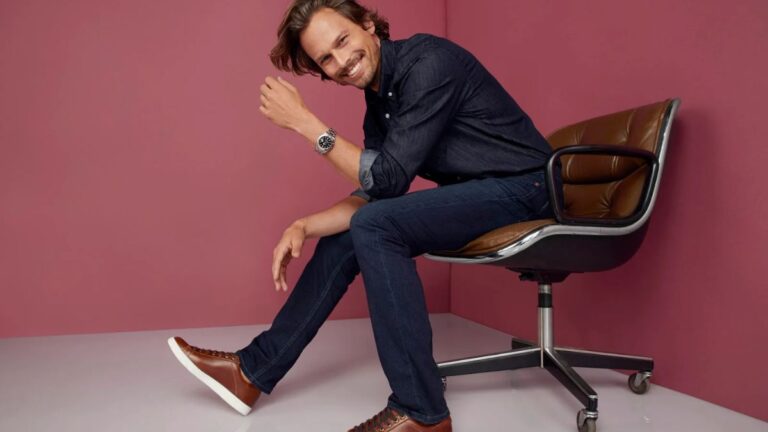Speaker Bio for ‘ Business Model Success Event on Skechers
Skechers is a renowned business strategist and industry expert with years of experience in scaling brand successes within the highly competitive footwear market. With an impressive career that spans two decades, their deep understanding of business models and consumer-driven strategies has positioned them as one of the leading voices in retail innovation.
As a key advisor and consultant for top-tier footwear brands, [Speaker’s Name] has played an instrumental role in shaping strategies to maximize profits and establish global brand recognition. Their expertise uniquely qualifies them to explore and deconstruct how Skechers rose to become the third best-selling footwear brand globally—a monumental achievement in a market shared by industry giants.
Known for their engaging storytelling and ability to deliver actionable insights, [Speaker’s Name] also brings a personal passion for fashion trends and understanding consumer behaviors that drive industry growth. When they’re not inspiring business leaders on stage or in boardrooms, they enjoy hiking and collecting vintage sneakers—melding their professional focus with a genuine love for footwear.
Don’t miss the chance to hear [Speaker’s Name] unravel the secrets behind Skechers’ unrivaled business strategy at [Event Details].
[Speaker Name]
[Speaker Name] is a seasoned leader in the footwear and retail industry, known for driving innovation and achieving remarkable growth. With over [X years] of experience, they have been instrumental in shaping strategies that redefine brand success on a global scale.
Being a key figure behind Skechers’ ascension as the third-best-selling footwear brand worldwide, [Speaker Name] has an unrivaled understanding of combining product creativity with market relevance. Their expertise spans across branding, operational strategy, and consumer-centric initiatives, making them a sought-after voice in the footwear and lifestyle space.
Beyond boardrooms and strategies, [Speaker Name] often shares their passion for design and business innovation through speaking engagements, helping entrepreneurs and business professionals stay ahead in competitive markets.
When not immersed in the world of shoes and business, [Speaker Name] enjoys [insert any hobbies or interests if known, e.g., exploring global fashion trends, hiking, or mentoring rising talent]. Their dynamic approach and engaging storytelling promise to deliver valuable insights into building a globally beloved brand.
Why Skechers Stands Out in the Footwear Market
Skechers has carved a unique niche in the competitive footwear industry through a blend of innovative strategies, diverse product offerings, and a keen understanding of their target audience. Unlike other brands that focus narrowly on specific market it has successfully appealed to a wide range of consumers, from casual wear enthusiasts to athletes and professionals. This versatility has been a significant driver of their global success.
One of the core pillars of its’ business model is their ability to deliver comfort without compromising on style. Their investment in proprietary technologies, such as memory foam soles and lightweight materials, has solidified their reputation as a customer-centric brand. Simultaneously, their product lines cater to varied tastes and needs, covering categories like casual sneakers, performance shoes, and work footwear. By addressing both functionality and fashion, it has managed to stay relevant amidst evolving consumer preferences.
Furthermore, their marketing approach has been instrumental in building brand loyalty and expanding their reach. Collaborations with celebrities and athletes, combined with effective digital campaigns and strategic retail placement, have amplified awareness and engagement. These efforts have not only boosted sales but also positioned Skechers as a relatable and aspirational brand for diverse demographics.
Their ability to scale operations globally while maintaining consistent quality and branding is another noteworthy factor. Skechers’ robust distribution network and adaptability to regional markets have enabled them to compete with industry giants like Nike and Adidas, solidifying their place as a top global contender.
By examining it’ remarkable trajectory, audiences can gain valuable insights into creating consumer-driven strategies that foster growth, innovation, and long-term brand positioning.
The Role of Innovation in Skechers’ Success
A key driver of Skechers’ rise to global prominence has been their commitment to innovation. Unlike many competitors who often rely heavily on established design norms, it has consistently embraced experimentation in both product development and operational processes. This forward-thinking approach has allowed them to introduce groundbreaking footwear solutions that resonate with diverse consumer needs.
Technological advancements, such as the integration of innovative cushioning systems like memory foam and arch support technologies, have set its apart in terms of comfort. These features have been instrumental in addressing the growing demand for practical yet stylish footwear, particularly in segments like athleisure and workwear shoes. Additionally, their focus on lightweight materials ensures their products cater to consumers seeking all-day comfort without compromising durability.
Beyond product innovation, it has also excelled in retail and distribution strategies. Their diverse mix of physical stores, digital platforms, and wholesale partnerships ensures that they can effectively reach their audience wherever they are. The adaptability of their shopping experiences—ranging from premium brand stores to affordable outlets—demonstrates their nuanced understanding of different buyer personas and market landscapes.
These ongoing innovations, combined with an ambitious yet calculated approach to growth, have solidified it as a trailblazer in the footwear market. For businesses seeking to thrive in competitive environments, Skechers serves as a prime example of how integrating innovation at every level can lead to sustained success and global recognition.
Lessons in Brand Management from Skechers
Skechers’ growth story offers a wealth of knowledge for businesses looking to develop strong, enduring brands. Central to this success is their ability to stay true to their core identity while adapting to changing consumer trends and market dynamics. Through a balanced approach to innovation and consistency, it has cultivated a recognizable brand that resonates with a broad audience.
One crucial lesson from it is the importance of listening to the consumer. Every product line introduced by the company reflects a deep understanding of what customers value most—be it comfort, style, affordability, or performance. By conducting market research and acting on feedback,it ensures they are not just meeting market needs but exceeding them.
Another significant takeaway is the critical role of branding and storytelling in creating an emotional connection with consumers. it has successfully positioned themselves as a versatile, approachable, and reliable brand. They achieve this through authentic marketing campaigns, relatable ambassadors, and consistent messaging that celebrates individuality and inclusivity. Businesses aiming to grow their market share can learn to cultivate a similar sense of trust and identification within their target audience.
Lastly, Skechers highlights the value of flexibility in global operations. From designing region-specific collections to partnering with local retailers, its demonstrates that adaptability can make a brand more relevant and accessible to diverse markets. Their ability to tailor strategies to individual regions without compromising the essence of their brand identity sets a benchmark for businesses aiming to expand globally.
By studying these facets of Skechers’ approach, companies can uncover actionable insights that could enhance their market positioning and drive sustainable growth in increasingly competitive industries.
Sustainability Practices and Social Responsibility
Another critical component of Skechers’ success story lies in their commitment to sustainability and social responsibility. With increasing environmental awareness among consumers, businesses are expected to adopt practices that reflect care for the planet, and it has risen to the challenge. The company has taken significant steps to reduce its carbon footprint, focusing on material innovation and operational efficiency.
Skecher has incorporated environmentally friendly materials into their product designs, including recycled polyester and biodegradable components for certain footwear lines. Their effort to reduce waste and promote recycling in manufacturing plays a pivotal role in addressing environmental concerns without compromising product quality. Furthermore, it has optimized their supply chain to limit energy consumption and minimize emissions during product transportation and storage processes.
On the social responsibility front, Skechers actively contributes to various charitable initiatives through their philanthropic arm, the Skechers Foundation. Programs such as the annual Skechers Pier to Pier Friendship Walk support education and children with special needs, highlighting the company’s dedication to supporting communities. Additionally, Skechers has implemented policies to ensure ethical labor practices across their global operations, showcasing a commitment to respecting and upholding human rights.
Through these efforts, its strengthens its brand as not just a footwear leader but a company that values societal and environmental well-being. This proactive approach appeals to today’s conscientious consumers and positions Skechers as a forward-thinking, responsible brand that aims to make a positive impact beyond profits. For businesses navigating a sustainability-driven market, it offers an exemplary model of how integrating eco-friendly and ethical practices can enhance brand equity and foster long-term success.
FAQs
Q: What sustainable materials does Skechers use in their products?
A: Skechers incorporates recyclable materials, such as organic cotton and polyester made from recycled plastic bottles, into their product lines. This helps reduce waste and promote more eco-friendly manufacturing processes.
Q: How does Skechers ensure ethical labor practices?
A: it has a robust system to monitor and enforce ethical labor practices across their global supply chain. This includes regular audits, partnerships with factories adhering to fair labor standards, and policies that uphold worker rights and workplace safety.
Q: Does Skechers support any charitable initiatives?
A: Yes, through the Foundation, the company supports various charitable causes, including the Skechers Pier to Pier Friendship Walk, which raises funds for children’s education and special needs programs.
Q: What steps is Skechers taking to reduce their environmental footprint?
A: Skecher focuses on sustainable production methods, including reducing water waste, implementing energy-efficient processes, and utilizing eco-friendly materials in their packaging and products.
Q: How can consumers learn more about Skechers’ sustainability practices?
A: Detailed information about Skechers’ sustainability and ethical initiatives is available on their official website under the “Corporate Responsibility” or “Sustainability” sections.






